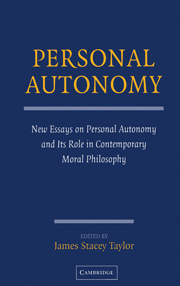Book contents
- Frontmatter
- Contents
- List of Contributors
- Acknowledgments
- Introduction
- PART I THEORETICAL APPROACHES TO PERSONAL AUTONOMY
- 1 Planning Agency, Autonomous Agency
- 2 Autonomy without Free Will
- 3 Autonomy and the Paradox of Self-Creation: Infinite Regresses, Finite Selves, and the Limits of Authenticity
- 4 Agnostic Autonomism Revisited
- 5 Feminist Intuitions and the Normative Substance of Autonomy
- 6 Autonomy and Personal Integration
- 7 Responsibility, Applied Ethics, and Complex Autonomy Theories
- PART II AUTONOMY, FREEDOM, AND MORAL RESPONSIBILITY
- PART III THE EXPANDING ROLE OF PERSONAL AUTONOMY
- Index
1 - Planning Agency, Autonomous Agency
Published online by Cambridge University Press: 03 December 2009
- Frontmatter
- Contents
- List of Contributors
- Acknowledgments
- Introduction
- PART I THEORETICAL APPROACHES TO PERSONAL AUTONOMY
- 1 Planning Agency, Autonomous Agency
- 2 Autonomy without Free Will
- 3 Autonomy and the Paradox of Self-Creation: Infinite Regresses, Finite Selves, and the Limits of Authenticity
- 4 Agnostic Autonomism Revisited
- 5 Feminist Intuitions and the Normative Substance of Autonomy
- 6 Autonomy and Personal Integration
- 7 Responsibility, Applied Ethics, and Complex Autonomy Theories
- PART II AUTONOMY, FREEDOM, AND MORAL RESPONSIBILITY
- PART III THE EXPANDING ROLE OF PERSONAL AUTONOMY
- Index
Summary
PLANNING AND CORE ELEMENTS OF AUTONOMY
Humans seem sometimes to be autonomous, self-governed agents: Their actions seem at times to be not merely the upshot of antecedent causes but, rather, under the direction of the agent herself in ways that qualify as a form of governance by that agent. What sense can we make of this apparent phenomenon of governance by the agent herself?
Well, we can take as given for present purposes that human agents have complex psychological economies and that we frequently can explain what they do by appeal to the functioning of these psychological economies. She raised her arm because she wanted to warn her friend; she worked on the chapter because of her plan to finish her book; she helped the stranger because she knew this was the right thing to do; he left the room because he did not want to show his anger. These are all common, everyday instances of explaining action by appeal to psychological functioning. In doing this, we appeal to attitudes of the agent: beliefs, intentions, desires, and so on. The agent herself is part of the story; it is, after all, her attitudes that we cite. These explanations do not, however, simply refer to the agent; they appeal to attitudes that are elements in her psychic economy. The attitudes they cite may include attitudes that are themselves about the agent and her attitudes – desires about desires, perhaps. But what does the explanatory work is, in the end, the functioning of (perhaps in some cases higher-order) attitudes. These explanations are, I will say, nonhomuncular.
- Type
- Chapter
- Information
- Personal AutonomyNew Essays on Personal Autonomy and its Role in Contemporary Moral Philosophy, pp. 33 - 57Publisher: Cambridge University PressPrint publication year: 2005
- 21
- Cited by



